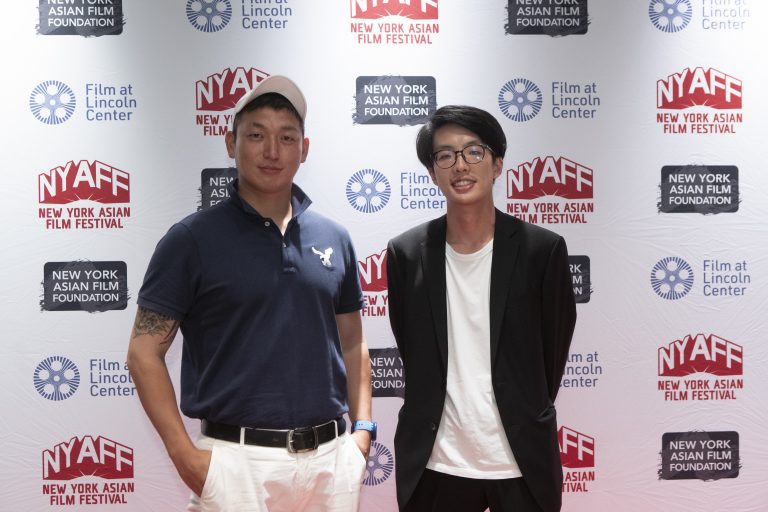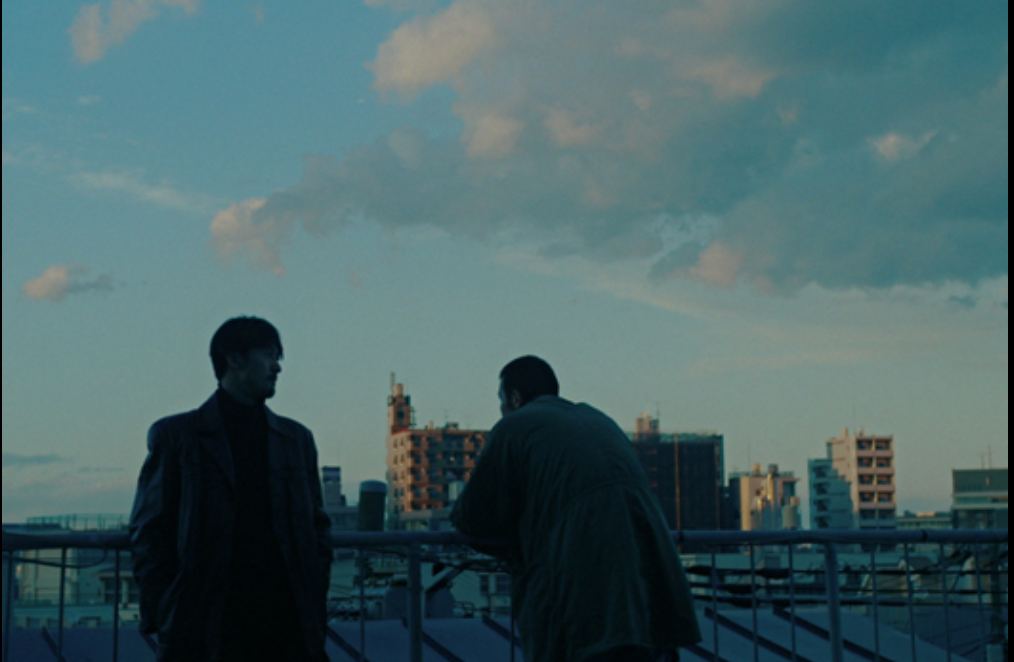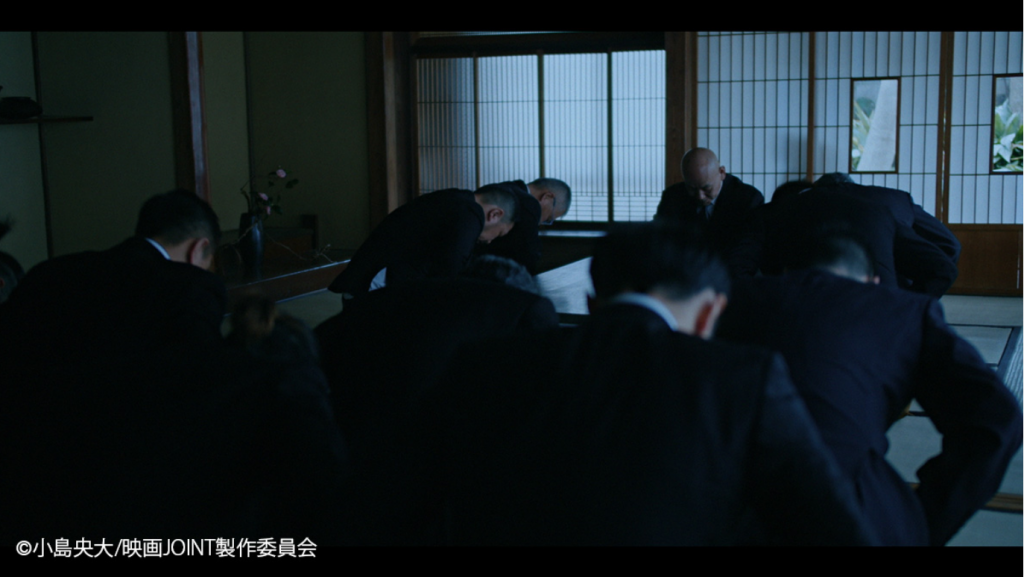
Photo by The New York Asian Film Festival
Synopsis : After serving 2 years in prison, Ishigami Takeshi spent two years working on a construction site and building up his funds before he returned to Tokyo with the help of Yasu, his best friend. He is determined to try and go straight but before he can do that, he has to raise even more money to break free of the criminal underworld and that requires a deep dive. He enlists his Korean friend Junghi and starts a business selling data for phone fraud to his Yakuza friend Yuki. As the business grows, Takeshi can just about make escape velocity, however, his old ties are holding him back and as a split in a yakuza family signals that start of a war, Takeshi finds himself getting dragged back down to the criminal underworld.

An Exclusive Interview with Director Oudai Kojima And Producer Chang-bak Kim
Q: How did you come up with the storyline? Is there any news article that it is based on?
OK: I did the outline first. We had a basic outline for the story, like he was an ex-con that comes out of prison, goes back to Tokyo and tries to stay out of the crime world but is dragged deeper into it. For the actual crime aspect of it, yeah, we had some references to real current cases, including Telephone fraud cases.
The case of the telephone fraud is actually real and it was like a few cases of people car-phoning from vehicles from a particular space, because it’s easier to track them, but with the vehicles they can go around Tokyo without being tracked easily. So that was one aspect that was real.
Of course the foreign organization aspect of it is also loosely based on reality right now. A few years ago the Chinese triads and the yakuza and the Korean mafia were more structured but now there is a more interconnected wave of crime groups. So I think that aspect is pretty well drawn into the film.
Q: I want to ask the producer: This is not obviously a star-driven film. How did you get the project off the ground?
CBK: Originally, I was allowed to participate in the role of Il Young, and while I was shooting, I felt that all the actors were unique. I was content with their work. So I just create a buzz, so that it would not be buried. In order to be recognized in Japan, we focused on such things like distribution companies, advertising companies, and pre-screening at Shinjuku Piccadilly, etc., while went over the budget a little.
Q: How much did you research about the Korean immigrant guy who helps the illegal immigrant. Did you know someone that you could get in touch with or did you find it in a book or something? Because it’s very intriguing how that web of crimes works in this film. Could you expand on that?
OK: I actually was really interested in how immigrants that come to Japan, most of them can’t really work in Japan in decent jobs. So they have jobs that are in the shady area, and I saw some documentaries about it. I thought it was an aspect of Japan that was not actually sheds a light on. So I think that part is grounded in reality.
But for the particular character of it, for the actor Jin-cheol san, I worked with him a couple of times before with some short films. So I knew that I wanted to cast him as a character in the film and I thought that type of character would be perfect for him because he has a protecting and loving kind of aura and also a little foreboding kind of sense to him. So I tried to base the character on him, and then put the immigrant crime aspect of it on him.
Q: I heard from some of the journalists about this film. You didn’t initially write a complete script, you started out like improv.
OK: Yes.
Q: So you gather the actors first and get to know each other, and then start to build the characters from that. Could you talk about how you did this? It’s kind of like a Mike Leigh style of filmmaking.
OK: Yeah, for this film I tried to, at first, not structure it too much. I had an outline, but not for every particular scene or every particular line. I was trying to structure the film around the characters more, and I wanted the characters to feel much more realistic and more documentary-like. And I also used nonprofessional actors which was one element to it.
So I tried to base the characters on the actors, actually, so an actor doesn’t really have to fake a personality or try to “act”, so he’ll naturally express more.
I tried to shape the story around, like, if this character did this to this character, I’ll have this new thing, which is actually better than the one that I was thinking of. So since the characters had more of an ad lib sense, with improv, the story was better written in improv, I think.
Q: I want to ask the producer: When you do this with no written screenplay but work from scratch, what is the producer’s viewpoint? Because you don’t have a script, and 70-80 percent of the actors are nonprofessionals. So how do you convince anybody to raise the money for this film?
CBK: In fact, because it was small budget to begin with, it has never been difficult to raise funds, and rather than that, we concerned about how do you start the work that won’t be buried like other films, and that it isn’t also just a self-satisfying work? We always thinking about it.
Q: They create the anti-organized crime laws against Yakuza in 1991. It drastically changed over the course of years. The style of yakuza has radically changed over the years, and this film really explores that element. Could you talk about how you wanted to tackle this subject matter? Yakuza is more business-minded now than violence oriented films that we used to see.
OK: The law was revised many, many times along the years and each time before it was revised the yakuza tried to use a loophole in the law to try to continue their crimes and tried to make a new way of business. And more and more it became more strict and hard for the yakuza to do the crimes they were committing or [run] their businesses. In recent years, it’s hard for the yakuza to do business among themselves, so they use non-yakuza-associated people instead. So that’s the Hangure(non-yakuza organized crime group), which is like mid-level criminals that aren’t yakuza but do yakuza-like work. It’s probably not known to international audiences, but it’s really distinct, and an interesting structure of crime in Japan because of that law.
So for this film I tried to portray the yakuza as like, they can’t do the crimes themselves so they have to use people like the main character to gather information for the fraud they do, and use young low-level criminals for the actual fraud work. And then they collect the money and bring it to them. So that crime law was really significant regarding this criminal structure in Japan.

Q: Do you think more venture busineess that are established recently more yakuza-related company than it used to be?
OK: Yes, because one of the loopholes is using such ventures or startups as an excuse to launder money or gather money –
Q: Money to invest in –
OK: Yes. So we call them business yakuza. They don’t have the particular tattoos that are traditional to them because if you have them, then you are “yakuza”. So they don’t get tattoos in the first place. And they look like regular businessmen but they actually do business with the yakuza. It’s like a white-collar yakuza. And they have to do everything in hiding.
Q: This film is unlike a Takeshi Kitano film or Kinji Fukusaku film. There’s not much violence in the film. Obviously, you create circumstances surrounding them that are more intriguing about this yakuza than the people used to be. The story line is not really probably familiar to American audiences. This is not just a depiction of Japan but this could be more appealing to viewers. Are you expected that this film might be shown in foreign countries while you’re making a film? Or did you just want to make this film?
OK: Yeah, for the violent aspects of it, in reality in Japan, there are not many really violent actions or cases regarding yakuza. Once a year there’s like a shooting kabukicho(Town that located in Shinjuku) or something. But if there’s like too many gun scenes in a film, it feels a little bit like ten years ago. I wanted to have the authenticity to it and also the reality that it’s taking place as we speak. I thought that violent scenes portray that. So that’s one element.
But also I was interested in how the violent actions occur the first time, like what kind of connections are made and what kind of connections are cut, in order for that violent action to happen. So I wanted to have like two or three violent scenes, and have a lot of scenes that incorporate around them. And I’m not concerned if it has spontaneity because I didn’t build the film around it, so there are much more interesting aspects besides the violence.
Q: This film is also showing in the Osaka Asian film festival. How was the reaction over there? Japanese are more used to that element of violence. Could you talk about the reception of the film in Osaka?
OK: The general reception was really good and they said it was fresh, not like a traditional yakuza film. And that was really good, because that was what I wanted to portray. They also liked the actors, and they did not believe that some of them were not really professional actors because they acted so naturally in the film.
Q : What reaction are you expecting from an American audience to this film?
CBK: The way of life as a yakuza is very tight now, because the police and laws. I think that the group called Hangure(non-yakuza organized crime group) that actually exists and very real, but I would like you to see the real crimes of amateur gangsters, not the so-called Yakuza.
OK: If you think of a Japanese crime film, the first thing you probably think about is yakuza, and I wanted to try to tell the American, or the international audience that it’s much more complicated than that, and of course as he said, the Hangure(non-yakuza organized crime group) exists. And the crime structure in Japan is really different from other countries, and I thought that shedding a light on that would be very interesting for an international audience.
Q: Since you speak very fluent English, you studied in the U.S. Do you want to expand your horizons by working in U.S or hiring the actors from a different continent?
OK: I really want to make a film anywhere, actually, not just in Japan. It was really fun to collaborate with many nationalities and not just Japanese people. It made the filmmaking feel a little more diverse than usual, which is really interesting, and really a thrill to shoot. For me, I really want to try to make a really good film in Japan also, but try to make a film internationally or in America. Yeah, of course I want to try to make some films in America too. But I believe I still want to try to make a Japanese film that doesn’t feel Japanese in Japan, which is really interesting for me.
Q: So after being in the United States and working in Japan, how do you see American films that portray Japanese actors or Japanese subjects?
OK: I guess people in New York can distinguish Japanese people from Chinese people and Korean people. But I think more than 50 percent of Americans can’t really distinguish them. So on that basis, there’s probably a stereotypical image of Japanese people still grounded in the Japanese cultures that are traditional to them, like sushi, ninjas or samurai.
But I don’t really think that’s necessarily bad, and I think a certain amount of stereotypical imagery is necessary to convey an image that is direct or enables us to understand in such a sense. Because in the film you don’t have much time to actually depict it. But in general, I think people are beginning to realize that it’s actually stereotypical and they are kind of self-parodying it a little, I feel. But in a general sense, yeah, the portrayal of Japanese things has been better, a lot, in these ten years.
Here’s the trailer of the film.

